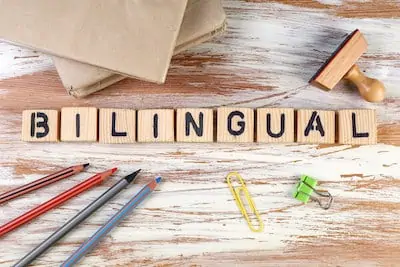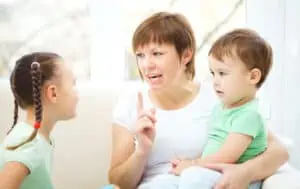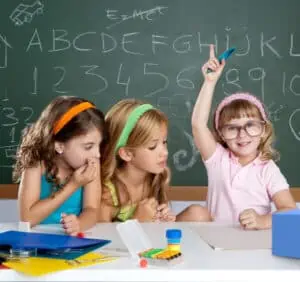I just wrote about raising bilingual children, but I wanted to talk about the benefit of being bilingual in a separate post. So here I am!
But with this post, I want to welcome any of you that only speak one language in the home. Meaning both you and your spouse speak just English. You may be wondering what your child would gain from learning a second language.
And you’re probably thinking, “Geez, that sounds like a LOT of work, Leslie.”
Oh, I know. Listen, I get it. We have so much we’re already doing. We’re taking care of our kids. Some of us are working on top of that which is adding a full load to an already full load.
Where does that leave time for you?
But hear me out…the benefits of being bilingual can really elevate your child into success down the road.
We think of our kids and what they want to do when they grow up. If they can do what they do and speak another language on top of it, it can make them beat out other candidates for a job.
Some things will be obsolete as the years go by. But stuff like languages is always needed to help us understand one another.
And when it comes to children from birth through the age of 3, the brain is very flexible at this point. It is far easier for your child to learn another language as a baby and toddler than when they get older.
This is why my eldest has no trouble when someone speaks to her in Chinese. She can turn on her heel and reply quickly without batting an eye. My youngest has a bit more problems because we left China while she was little, but she still does a good job speaking it.

When it comes to learning a second language, it doesn’t have a negative effect on your child’s own native language. It’s an added skill that may boost them in their careers as adults.
How else does being bilingual benefit your child?
- They fine-tune concentration skills
Believe me, at first; you will not think this is true. But your child will learn to focus on the language currently being spoken and switch between it with the second one. Having this ability at an early age means your child will be able to tune out all the din in a room and zero in on what’s important.
- Better problem-solving skills
When you have a bilingual child, they can more easily solve problems. This is tied to the concentration I just spoke about, where they are used to flipping from one language to the next to say what they need to say. It helps them sort and define things like keeping their language vocabularies organized in their minds.
- They’re more creative
I can attest to this with both kids, and they are superb at explaining scientific concepts as well. My youngest started discussing magma and lava in depth while my eldest laid out hypotheses for me about a project at school. This stuff just flows more easily for them because of their ability to decode and interpret two different languages.
- They will wow you with their vocab skills
From an early age, each of my daughters knew words in English that were far beyond their levels. But my eldest fascinates me since she’ll be able to easily explain the definition of a word to my youngest when I draw a blank.
You might think being bilingual would make it harder to read, spell, or keep up with vocabulary, but the opposite is true. They get those weird tenses and sounds and build this massive dictionary in their minds in both their languages. It’s one of the coolest things about being bilingual.
- They’ll be less likely to experience mental decline later on
Well, as long as they keep their brains challenged like this. Bilingual children have both sides of the brain engaged even when they are only speaking one language at the moment. It enhances cognitive abilities, so their thinking is sharp like a tack.
As a side note, this does bite me in the butt sometimes because my eldest has outwitted me on several occasions. I’ll have to keep up with my own languages to outsmart her.
And, of course, this also improves their memories. They must retain more information and pull it out when they need it. It’s little wonder why my kids win whenever we play Old Maid. They also respond more quickly because their brains are activated in this way.
- It leads to outstanding communication
Learning a second language is one way to master communication. I remember feeling lost trying to keep up and speak with others in China. It was a blessing when someone would say something to me in English.
Not only do our bilingual children learn how to bridge that gap and help others struggling with a secondary language, but they also have skills with understanding and listening. They can listen better to what is needed and act accordingly.
- A whole new world of open doors
When you speak another language, there’s so much more to discover in the world around you. Communicating with people from other cultures is exciting, and it’s fun for your kids when they realize they can make new friends in that other language.
Additionally, it’s important when you have different cultures as we do in our family. If my children didn’t know Chinese, they’d have a hard time speaking to my husband’s parents on the phone because his parents don’t speak English.
My parents aren’t bilingual, but they have always encouraged their grandchildren to learn Chinese. They think it can only elevate their lives, and I agree.
Even if you have no other cultures in your family, learning another language can help you be more understanding and improve your own skills. But for kids, encouraging them to learn another language is ideal for carrying that skill with them through life.
Think of how often you applied for jobs that sounded perfect only to see that they wanted someone bilingual in another language. Usually, that other language is Spanish in the US, but not always.
It really will be a blessing for your kids. If you do not have a multicultural home, think about your ancestry. You can all always learn something together too.
For example, even if you and your husband were born and raised in America, perhaps your ancestors were from France, Italy, or Korea. Getting to know that side of your roots will only enhance your family and add a special skill you can draw upon.
Besides, it really feels good to chime into a conversation in a different language and see how surprised people are that you understand them. I’ve made more than one friend that way, so give it a try, and encourage your children to do the same.
Leslie Berry lives with her husband and two young daughters in Los Altos, California, where she loves helping other moms get comfortable with motherhood and embracing the insanity with facts peppered with laughs.
She loves eating too much sushi, exercising, and jamming out on her Fender. Read more about Leslie here.




